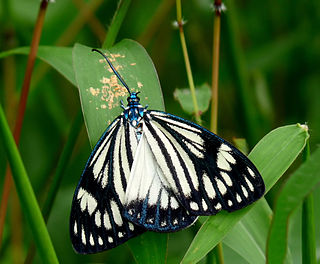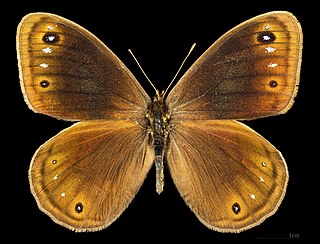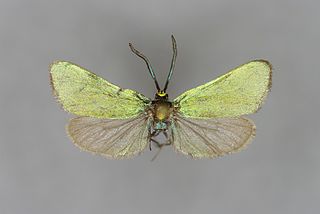
The Atlas Mountains are a mountain range in the Maghreb in North Africa. It separates the Sahara Desert from the Mediterranean Sea and the Atlantic Ocean; the name "Atlantic" is derived from the mountain range. It stretches around 2,500 km (1,600 mi) through Morocco, Algeria and Tunisia. The range's highest peak is Toubkal, which is in central Morocco, with an elevation of 4,167 metres (13,671 ft). The Atlas mountains are primarily inhabited by Berber populations.

The Zygaenidae moths are a family of Lepidoptera. The majority of zygaenids are tropical, but they are nevertheless quite well represented in temperate regions. Some of the 1000 or so species are commonly known as burnet or forester moths, often qualified by the number of spots, although other families also have 'foresters'. They are also sometimes called smoky moths.

Hyles tithymali, the Barbary spurge hawk-moth, is a species of moth in the family Sphingidae first described by Jean Baptiste Boisduval in 1834. Genomic analysis places the entire species as a subspecies of Hyles euphorbiae. It is found in North Africa, the Canary Islands, Madeira, some islands in the Mediterranean Sea and in the mountains in Yemen.

Theresimima is a genus of moths. T. ampellophaga, the vine bud moth, is a moth of the family Zygaenidae. It is found from Algeria, Spain and southern France through most of southern Europe to the northern coast of the Black Sea. In the north, it ranges up to Hungary and Slovakia and in the east, the range extends to the southern part of European Russia, the western Caucasus and Transcaucasia, through Turkey, Lebanon and Syria to Israel.

Hipparchia hansii is a species of butterfly in the family Nymphalidae. It is endemic to the North African region, mainly Morocco, Algeria, Tunisia and western Libya. Its natural habitats are dense soil, grazed and rocky slopes, and ridges. It prefers to stay in the shade. This is one of the last butterflies that flies in the season.

Berberia lambessanus is a species of butterfly in the family Nymphalidae. It is endemic to the North African region, mainly Morocco, Algeria, and Tunisia. It flies in the vast steppes but has a preference for slopes, and the males are easily seen flying in search of a shy female. Usually, females are fertilised as soon as they hatch. The range of Berberia lambessanus overlaps with that of B. abdelkader
Jordanita algirica is a moth of the family Zygaenidae. It is found in Morocco, Algeria and Tunisia. There are also some unconfirmed records from Sicily.
Jordanita rungsi is a moth of the family Zygaenidae. It is found in the central areas of the Middle Atlas in Morocco.
Jordanita carolae is a moth of the family Zygaenidae. It is found in the south-eastern High Atlas in Morocco at altitudes between 1,000 and 1,500 meters.
Jordanita benderi is a moth of the family Zygaenidae. It is found in the High Atlas in Morocco.
Jordanita maroccana is a moth of the family Zygaenidae. It is found in the Middle Atlas in Morocco. It is found at altitudes of up to 2,000 meters.

Jordanita chloros is a moth of the family Zygaenidae.
Jordanita graeca is a moth of the family Zygaenidae. It is found from southern Slovakia through Hungary, the Balkan Peninsula, Rhodes and Cyprus to southern Russia, Ukraine, Transcaucasia, Turkey, Iran and northern Iraq.

Jordanita tenuicornis is a moth of the family Zygaenidae.
Adscita albanica is a moth of the family Zygaenidae. It has a disjunct distribution, which included south-eastern France, Switzerland, in Italy, Slovenia, North Macedonia, Albania, Bulgaria, Greece, Ukraine, the southern part of European Russia and the Caucasus.
Adscita bolivari is a moth of the family Zygaenidae. It is endemic to Spain.
Adscita capitalis is a moth of the family Zygaenidae. It is found in North Macedonia, Greece and Turkey.
Adscita schmidti is a moth of the family Zygaenidae. It is found on the Iberian Peninsula west of the Ebro river.

Adscita geryon, the cistus forester, is a moth of the family Zygaenidae. It is found in southern and central Europe, east to Turkey. It is also present in Great Britain.

Adscita mannii is a moth of the family Zygaenidae. It is found in Germany, France, Switzerland, Austria, Italy, Spain, Slovenia and the Balkan Peninsula. The range extends to north-western Turkey.








